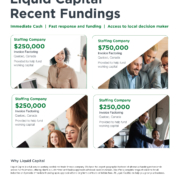Grow better with non-dilutive funding
For growing businesses, having sufficient working capital is critical to take advantage of new opportunities and overcome challenges. Achieve your growth goals (or help your client reach theirs) with non-dilutive funding options.

Working capital is crucial when you’re in growth mode and looking to fund everything from an expanded payroll to supplies. But if you or your client are searching for financing, it’s clear that not all options are created equal, or best suited for all entrepreneurs — especially if you’re looking to retain full control and ownership of your business.
Non-dilutive funding 101
With dilutive funding, such as equity financing through angel investors or venture capital, business owners give equity investors a percentage stake in company ownership, a share in its future profits and in many cases, a say in decision-making.
On the other hand, non-dilutive funding solutions allow you to obtain the working capital you need while retaining ownership and full decision-making capabilities about your business’s current and future direction.
Non-dilutive funding can include business loans, crowdfunding, grants, revenue-based financing or venture debt. It can also include alternative funding options like invoice factoring or asset-based lending. Depending on the type of non-dilutive funding, loan/interest payments may be required or there may be conditions on how funds can be used. Some grants, for example, are specifically for environmental projects or employment-related initiatives.
For fans of the long-running television shows Dragons’ Den and Shark Tank, dilutive funding is what you’ll have seen most often — businesses that successfully receive funding usually give up an equity stake in their business in return for a certain amount of money. But it’s not always the case.
In select situations, Dragons and business owners have come to non-dilutive financing arrangements, usually because it was in the best interest for the entrepreneur.
One Dragons’ Den hopeful sought $100,000 for a 10% equity stake. Dragon Michele Romanow felt that equity was too high a cost to fund advertising and inventory. She instead offered the entrepreneur a non-dilutive ‘revenue-sharing’ deal — $100,000 for 10% of their revenue, plus a 6% fee, until the company paid back their capital.
The benefits of non-dilutive funding
Seeking capital that is non-dilutive, rather than an equity-based solution, can have several advantages for entrepreneurs, including:
![]() Retaining control of the business: With a non-dilutive funding option, the lender will have no stake in company decisions or the future direction of the business. This can make it the preferable route for entrepreneurs seeking to follow through on a particular growth strategy without compromising or sacrificing ownership.
Retaining control of the business: With a non-dilutive funding option, the lender will have no stake in company decisions or the future direction of the business. This can make it the preferable route for entrepreneurs seeking to follow through on a particular growth strategy without compromising or sacrificing ownership.
![]() Avoiding equity dilution: Every time a business raises funds via equity financing, new shares in the company are issued and ownership percentages for existing shareholders are reduced. With non-dilutive funding, you can avoid this issue and maintain the power of your existing equity.
Avoiding equity dilution: Every time a business raises funds via equity financing, new shares in the company are issued and ownership percentages for existing shareholders are reduced. With non-dilutive funding, you can avoid this issue and maintain the power of your existing equity.
![]() Realizing long-term value: With non-dilutive funding options, company owners retain their company’s full value — allowing them to take complete advantage of future growth.
Realizing long-term value: With non-dilutive funding options, company owners retain their company’s full value — allowing them to take complete advantage of future growth.
![]() Strengthening relationships: Some non-dilutive funding options provide quick access to working capital. When you can ensure your payroll or other accounts payable obligations are met on time, relationships with employees, contractors, and suppliers are strengthened. This can also help you to deliver positive customer service.
Strengthening relationships: Some non-dilutive funding options provide quick access to working capital. When you can ensure your payroll or other accounts payable obligations are met on time, relationships with employees, contractors, and suppliers are strengthened. This can also help you to deliver positive customer service.
For tree clearing company Rayzor Edge Tree Service, a non-dilutive funding solution — invoice factoring — allowed owner Ray Bowman to not only realize his vision of expanding into the commercial market, but helped him quickly overcome cash flow challenges resulting from long invoice payment terms. By paying subcontractors in a timely manner, Ray has improved relationships with his industry colleagues, improved client service and found a supportive business partner in his Liquid Capital Principal. Read the story here
When it comes to considering non-dilutive funding options, invoice factoring is a choice that can make sense for many start-ups.
The key characteristics of invoice factoring as a non-dilutive funding option include:
![]() Ownership retention: Invoice factoring does not involve giving up equity ownership in the business. Instead, funds are advanced based on the value and creditworthiness of your accounts receivable.
Ownership retention: Invoice factoring does not involve giving up equity ownership in the business. Instead, funds are advanced based on the value and creditworthiness of your accounts receivable.
![]() Avoiding debt: Invoice factoring isn’t a loan you’ll have to pay back — instead, the factor will collect invoice payments from your customers and pay you the balance, less applicable fees. The costs associated with factoring are also lower than the cost of capital or returns required by equity investors or venture capital.
Avoiding debt: Invoice factoring isn’t a loan you’ll have to pay back — instead, the factor will collect invoice payments from your customers and pay you the balance, less applicable fees. The costs associated with factoring are also lower than the cost of capital or returns required by equity investors or venture capital.
![]() Improving cash flow: Factoring provides your business with immediate cash flow by converting accounts receivable into liquid funds. This can help companies manage their working capital and cover operational expenses without taking on additional debt or giving up ownership.
Improving cash flow: Factoring provides your business with immediate cash flow by converting accounts receivable into liquid funds. This can help companies manage their working capital and cover operational expenses without taking on additional debt or giving up ownership.
![]() Better terms for start-ups: With equity financing, companies are usually subject to rigorous legal and business due diligence, as investors want to ensure the company meets its criteria and is a good fit for their investment portfolio. Similarly, traditional lenders often also require companies to meet stringent criteria before loaning funds, emphasizing detailed financial statements, projections, your credit score or collateral. With invoice factoring, the creditworthiness of your customers’ invoices (rather than your credit or annual results) is a main consideration. Invoice factoring may be preferable for start-ups without a long financial history. Seeking working capital through invoice factoring can also help a company drive growth, build credit and become bankable over time.
Better terms for start-ups: With equity financing, companies are usually subject to rigorous legal and business due diligence, as investors want to ensure the company meets its criteria and is a good fit for their investment portfolio. Similarly, traditional lenders often also require companies to meet stringent criteria before loaning funds, emphasizing detailed financial statements, projections, your credit score or collateral. With invoice factoring, the creditworthiness of your customers’ invoices (rather than your credit or annual results) is a main consideration. Invoice factoring may be preferable for start-ups without a long financial history. Seeking working capital through invoice factoring can also help a company drive growth, build credit and become bankable over time.
![]() Flexibility: Taking on an equity partner may mean another individual has a say in your company’s decision-making — ideas based on their own values and plans for your business. The funds you receive from invoice factoring come with no set purpose. Whether you choose to use your capital to fund growth, to pay suppliers, cover payroll or invest in new technology, it’s your choice, as long as invoices are paid. The length of time you need to use invoice factoring services is also flexible. Liquid Capital won’t lock you into a long-term contract. If you have months with adequate cash flow where you don’t need to factor your invoices, you can opt out of the process.
Flexibility: Taking on an equity partner may mean another individual has a say in your company’s decision-making — ideas based on their own values and plans for your business. The funds you receive from invoice factoring come with no set purpose. Whether you choose to use your capital to fund growth, to pay suppliers, cover payroll or invest in new technology, it’s your choice, as long as invoices are paid. The length of time you need to use invoice factoring services is also flexible. Liquid Capital won’t lock you into a long-term contract. If you have months with adequate cash flow where you don’t need to factor your invoices, you can opt out of the process.
![]() Quick access to the funds you need: As opposed to equity financing or applying for funding from a traditional lender, which can take months to complete, applications for financing through the sale of your credit-worthy invoices are not subject to lengthy wait times.
Quick access to the funds you need: As opposed to equity financing or applying for funding from a traditional lender, which can take months to complete, applications for financing through the sale of your credit-worthy invoices are not subject to lengthy wait times.
At Liquid Capital, we offer stress-free invoice factoring services. The approval process takes minimal time — if your business and accounts receivable clients are in good standing, you’ll receive 80% or more of the value of your accounts receivable quickly and securely.
Interested in discussing ways alternative funding can help your (or your clients’) financial stability? Contact a Liquid Capital Principal today.







